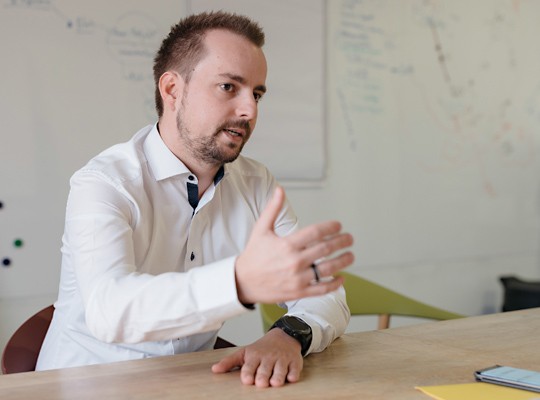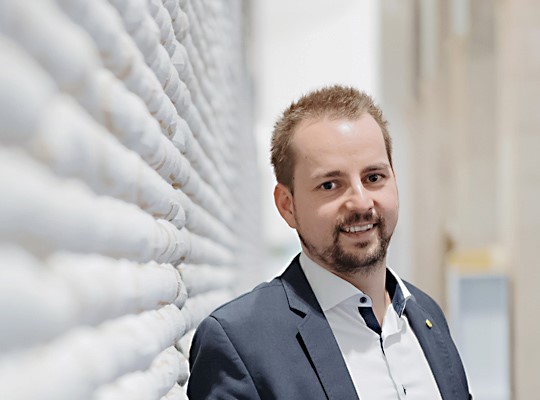IoT ecosystems
On its own, IoT will never amount to much
The biggest obstacle for IoT is rarely the technology, it's the culture. IoT projects require partnerships that are based on trust. Julian Dömer, Head of IoT at Swisscom, is therefore calling for supplier openness and senses opportunities for intelligently designed ecosystems.
Text: Hansjörg Honegger, Images: Daniel Brühlmann, 18 December 2018
IoT is still in some ways a vision for the future. What is your dream project?
Julian Dömer: My dream is a fully digital building. I often walk around looking for rooms, coffee machines or printers or unintentionally forget to turn off the light when leaving. A building that understands me, my habits and my schedule – that would be my dream.
Solutions like this already exist to some extent today.
Yes, but often only as individual solutions. The difficulty lies in fragmentation: the people in facility management have nothing to do with the people who reserve the rooms who, in turn, may not know who is responsible for the printer. All of these service providers would have to work together in a visionary IoT project.
This mean that IoT projects currently fail due to insufficient coherence and not because of technology. Would the companies that use the technology need to make changes?
No, the supplier side would have to regroup. Let’s take the manufacturing industry which is already pretty far along when it comes to the Internet of Things. A company that wants to introduce an IoT solution in this industry has a broad spectrum of potential partners: suppliers of machines and raw materials, software programmers – ERP, machine control, etc. – network suppliers, maintenance providers and other participants. All these parties have to work together to get an IoT project off the ground.

You’re talking about ecosystems?
Exactly. Suppliers need to form new partnerships so that interesting projects can be launched. In recent years, we have implemented the most obvious IoT projects, like automatic reading of the electricity meter. Now it’s getting more complicated.
How so?
The companies involved don’t just have to be on the same page, they also have to deploy the right people.
What is Swisscom’s role?
We are a platform provider. And it’s something we do very well: we have scalable infrastructure, we know how to operate it. However, we often don’t understand the business logic well enough. This requires specialists. But they often lack an understanding of platform operation. This creates a win-win situation.
Who brings the ecosystem together?
This is often Swisscom’s job which totally makes sense: we know the customers thanks to our size and our dense network with Swiss companies. On the other hand, we are also familiar with the potential partners. We bring platforms, people, skills and teams together. This is possible because we are trusted by all sides.
What happens when something goes wrong? Who answers for the failure?
The use of new technologies always involves the possibility of failure. In this case, the primary focus shouldn’t be on deciding who’s to blame, but on the reasons for the failure. These lessons give rise to new ideas.

You operate in an environment that moves extremely fast. Can the rapid changes in technologies and standards be one reason for the failure of IoT projects?
Not necessarily. IoT projects offer new solutions for things that have been well established for many years. For these kinds of projects, I have to rely on expertise from very different areas. I need two fundamental skills: on the one hand, the openness to question and change what is already established. And, on the other hand, the ability to trust third parties who contribute their own services. The ideal mix is not always guaranteed in this case. Many IoT projects fail because there isn’t a shared culture. If the chemistry is off in this kind of team, it is extremely difficult. In order to successfully implement IoT projects in an ecosystem, there needs to be a cultural shift in companies.
And yet: the rampant growth prevalent in the IoT sector is becoming an obstacle for many suppliers.
Yes, it’s a problem. According to market analysts, there are 450 to 600 different IoT platforms worldwide today. But the problem has been identified and at the moment the protocols and platforms are being standardised. We’re about halfway there.
Wouldn't it then be better for the user companies to wait and see how this develops?
This decision depends, on the one hand. on the lifecycle of the production plant. You don't just build a new factory for an IoT project. On the other hand, you need a certain willingness to embrace risk. Without it, you might just miss the boat.
In concrete terms, how do entrepreneurs initiate this kind of project?
They just have to call me (laughs). No, but seriously: The first step is knowing exactly what your own weaknesses are. A business case can then be derived on this basis. An external perspective on problems is often helpful. Which is where Swisscom comes in.
Can Swisscom hold its own against the international competition?
In contrast to global providers, Swisscom's advantage is that it is still small enough. Our internal experts know and trust each other and are open with one another. They share a common understanding of work culture, live in the same region and speak the same language as our customers. This creates mutual trust, which makes a completely different culture of cooperation possible. Added to this is the unparalleled scope of expertise that makes it possible to eliminate the silo mentality and bring all the experts together at one table across disciplines.

But despite everything, IoT security is still a big challenge.
In this context, it is important to clearly distinguish where the data flows. IoT cases that are handled over the Internet have to be analysed very carefully: What devices and control units are used? Who has access? Which data is transported? Here the risk – keyword DDoS – is actually very high. The vast majority of our IoT projects – now well over 500 – operate via private networks. We do a great deal to protect these networks. This approach provides a completely different basis in terms of security.
How will the IoT business develop in the next few years?
The first wave, which is now slowly coming to an end, focused on networking. We are at the beginning of the second wave, which will see the emergence of many new business cases that go beyond networking. I would venture to say that in five years IoT will have as much impact on the economy and society as smartphone technology has had in the last 10 years.
Swisscom Enterprise IoT
Swisscom's Enterprise IoT combines various access technologies, platforms and a large ecosystem. Thanks to a modular approach not dependent on any specific technology, customers can easily network and manage IoT objects, process IoT-based data in a meaningful way, and thus advance their business. Swisscom also provides access to an established IoT ecosystem and other components such as cloud security and data analytics solutions for end-to-end IoT implementation. Swisscom has 15 years of experience as an IoT pioneer.
Julian Dömer
Julian Dömer has a degree in business administration and gained initial professional and project experience in the pharmaceuticals industry both during and after his studies. After starting out as a plant engineer, Mr Dömer moved into consulting, where, as a Business Developer, he managed international clients with a focus on regulation and certification. He joined Swisscom in 2011, where he worked in product management to shape the development of IP-based broadband products for SMEs. In 2014, he headed up the development of SDN/NFV-based network products in conjunction with Swisscom’s Innovation department, gaining extensive experience in agile software development and the related transformation in the field of telecommunications. Since moving to Swisscom’s corporate customer team at the start of 2017, Julian Dömer has been responsible for 5G development in the Mobile Business Solutions department and was Head of Innovation until October 2018. He is currently the head of IoT at Swisscom Enterprise Solutions.
More on the topic



